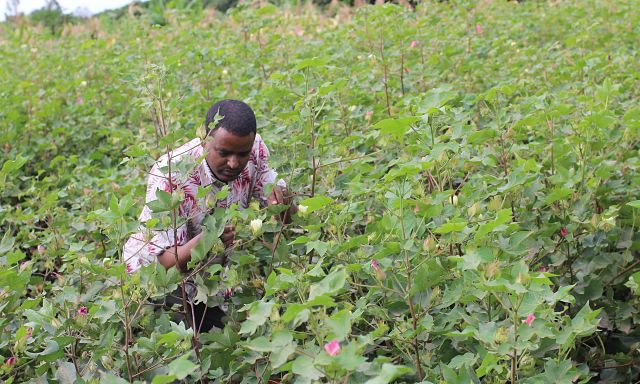 Tadesse Amera works with smallholder farmers in Arba Minch area to produce organic cotton. (The Guardian)
Tadesse Amera works with smallholder farmers in Arba Minch area to produce organic cotton. (The Guardian)
By Tadesse Amera
These organic cotton farmers would still use pesticides if it weren’t for UK donations. We shouldn’t let the scandals faced by some charities alter our behaviour
Among crops, cotton is notorious for the high volumes of hazardous pesticides used to grow it. Pesticide poisoning of smallholder farmers is all too common and indiscriminate use is a major cause of water pollution and biodiversity loss. For years, the accepted wisdom around the world has been that it is uneconomical to grow cotton in any other way. But today farmers in Ethiopia are proving that it is not only possible, but profitable, to grow cotton without pesticides.
I work with smallholder cotton farmers in the Arba Minch area in the south of the country. In the early 2000s they benefited from some training on sustainable agriculture and, despite having no funding, were very keen to continue. Many had suffered from pesticide poisoning themselves or had witnessed the suffering of family or friends. The high cost of pesticides, coupled with dwindling profits, was having an adverse effect on family incomes. They were motivated to find safer and cheaper methods of cotton production.
While Ethiopia has a number of well-established organic coffee producers, there were then no certified organic cotton farmers in the country, and what happened next was only possible because of international support…The project began with 90 farmers and we have provided practical training to more than 2,000 to date. The successes we have achieved in Ethiopia have only been possible thanks to the generosity of the UK public. That is why, while it is right that sexual abuse and exploitation by aid workers is investigated and uncovered, I hope that the scandals facing Oxfam and Save the Children will not discourage people from supporting the charities that so many projects around the world rely on for support.
Most of the families we work with depend on cotton for income to pay for food, medicine, schooling and other essentials. They are understandably cautious about adopting new approaches, as a failed crop can spell disaster for the family. By first working alongside farmers on test plots, they develop confidence in their skills and experience the pros and cons of new methods first-hand. Close monitoring by our dedicated field agents allows us to measure production costs and yields to determine which techniques work best.
—
Join the conversation on Twitter and Facebook.

























